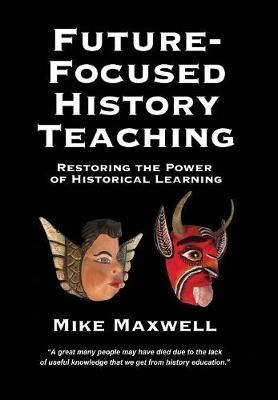Future-Focused History Teaching: Restoring the Power of Historical Learning

Future-Focused History Teaching: Restoring the Power of Historical Learning
HISTORY EDUCATION IS IN DECLINE because it fails to provide knowledge useful in the future as other school subjects do. This book calls on history teachers to restore the power of historical learning. Education exists to impart knowledge useful in the future. School subjects other than history identify general principles derived from their subject matter that describe how the world works, principles that can be applied in the future such as addition in mathematics, grammar in language, and gravity in science. These disciplines pass on their general principles to teachers who pass on this knowledge to students. Historians, however, concentrate on describing events of the past. Without general principles to impart, history teachers are left to recount one-time bygone events, most of which have little or no relevance to the present and future. Without principles useful in the future, history is unable to fulfill the purpose of education the way other school subjects do; society has no practical means to learn from the past; and the cycle of historical ignorance can perpetuate indefinitely. Educators commonly try to compensate for history schooling's lack of knowledge useful in the future by emphasizing skills knowledge instead: critical thinking skills or the job skills of professional historians. Other school subjects also have their critical thinking skills and professional practices, but in these other disciplines general principles constitute the foundation of learning because knowledge of how the world works is a necessary prerequisite to critical thinking. In history education that prerequisite is missing. The truth is, history has been supplying humans with useful principles of knowledge for at least 2,400 years, since the time of Thucydides in Greece and Sun Tzu in China. In earlier times, history could involve more than the act of describing past events; it could involve the ambition to derive from events principles useful in the future, an ambition that the history profession has largely abandoned. This loss deprives historical learning of the power possessed by other intellectual disciplines. If historians wish to concentrate on the role of describing events of the past, that's their business. Then the task of providing knowledge useful in the future falls to history educators, because that's their business.FUNDAMENTALS OF FUTURE-FOCUSED HISTORY TEACHING INCLUDEFive basic principles of history educationA coherent and useful purpose to guide ins
PRP: 216.69 Lei
Acesta este Prețul Recomandat de Producător. Prețul de vânzare al produsului este afișat mai jos.
173.35Lei
173.35Lei
216.69 LeiLivrare in 2-4 saptamani
Descrierea produsului
HISTORY EDUCATION IS IN DECLINE because it fails to provide knowledge useful in the future as other school subjects do. This book calls on history teachers to restore the power of historical learning. Education exists to impart knowledge useful in the future. School subjects other than history identify general principles derived from their subject matter that describe how the world works, principles that can be applied in the future such as addition in mathematics, grammar in language, and gravity in science. These disciplines pass on their general principles to teachers who pass on this knowledge to students. Historians, however, concentrate on describing events of the past. Without general principles to impart, history teachers are left to recount one-time bygone events, most of which have little or no relevance to the present and future. Without principles useful in the future, history is unable to fulfill the purpose of education the way other school subjects do; society has no practical means to learn from the past; and the cycle of historical ignorance can perpetuate indefinitely. Educators commonly try to compensate for history schooling's lack of knowledge useful in the future by emphasizing skills knowledge instead: critical thinking skills or the job skills of professional historians. Other school subjects also have their critical thinking skills and professional practices, but in these other disciplines general principles constitute the foundation of learning because knowledge of how the world works is a necessary prerequisite to critical thinking. In history education that prerequisite is missing. The truth is, history has been supplying humans with useful principles of knowledge for at least 2,400 years, since the time of Thucydides in Greece and Sun Tzu in China. In earlier times, history could involve more than the act of describing past events; it could involve the ambition to derive from events principles useful in the future, an ambition that the history profession has largely abandoned. This loss deprives historical learning of the power possessed by other intellectual disciplines. If historians wish to concentrate on the role of describing events of the past, that's their business. Then the task of providing knowledge useful in the future falls to history educators, because that's their business.FUNDAMENTALS OF FUTURE-FOCUSED HISTORY TEACHING INCLUDEFive basic principles of history educationA coherent and useful purpose to guide ins
Detaliile produsului









